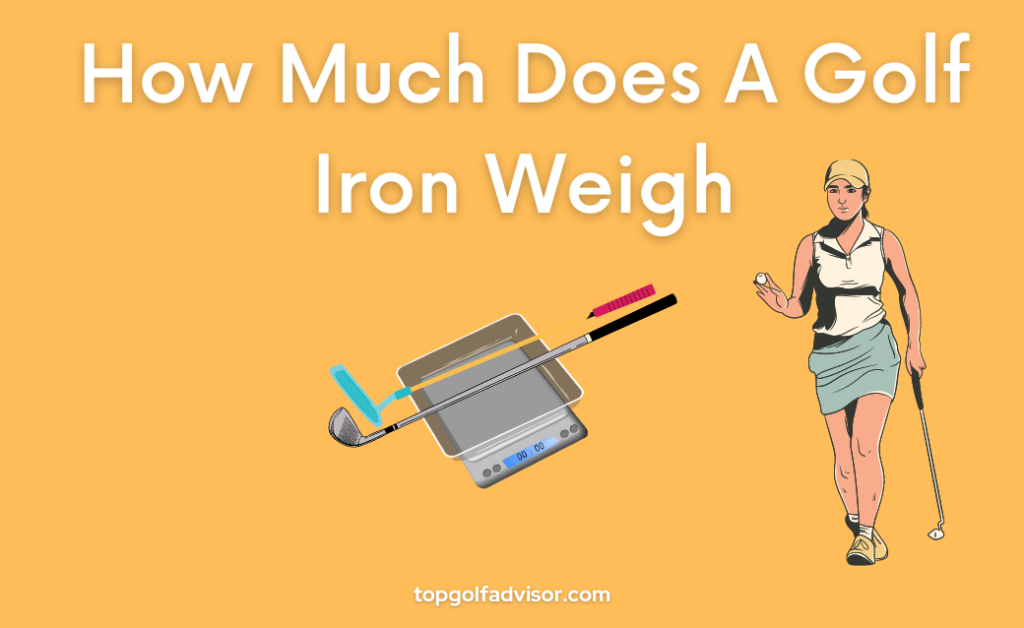You need the correct tools, technique, and precision to play golf at a high level. The golf clubs, notably the golf iron, are among the crucial equipment. A golf iron is a club for short to mid-range shots, usually on the fairway or near the green.
How much does a golf Iron weigh? This is a common query that golfers may ask while choosing a golf iron. The golf iron’s weight significantly influences a golfer’s swing, feel, and general effectiveness on the course.
In this article, we’ll examine the numerous aspects of a golf iron’s weight, including its length, head style, and material composition. We’ll also look at the advantages and disadvantages of various weights and offer advice on choosing the best golf iron weight for your game.
Knowing the weight of a golf iron is crucial to developing your game and getting greater results on the course, regardless of your level of experience.

How Much Does A Golf Iron Weigh?
The golf iron’s weight significantly influences a golfer’s swing, feel, and general effectiveness on the course. In this article, we’ll look at the various aspects that affect a golf iron’s weight, weigh the benefits and drawbacks of various weights, and offer advice on choosing the ideal weight for how you play.
What are the Factors That Determine the Weight Of a Golf Iron?
Several factors determine the weight of a golf iron. Having an understanding of these elements will assist you in selecting the ideal weight for your golf irons.
Arguably the most important element that affects a golf iron’s weight is its length. In general, golf irons get heavier as they go longer. For instance, a regular 7-iron usually weighs between 10 and 12 ounces. Golf irons, on the other hand, can weigh up to 14 or 15 ounces as they get longer.
Golf iron weight may also be influenced by the head’s design. For example, golf irons with a cavity back tend to be lighter than those with a blade-style back. It’s so that more weight can be dispersed over a smaller area, necessary for blade-style golf irons’ smaller clubheads. Conversely, golf irons with a cavity back have a larger clubhead and are lighter due to the weight distributed around the clubhead’s perimeter.
Materials: A golf iron’s weight may vary depending on the materials used to produce it. Steel and other materials like graphite or titanium are typically combined to create golf irons. Therefore, golf irons made of graphite or titanium are often lighter than steel ones, which tend to be heavier.
The Pros and Cons of Different Golf Irons?
Here’s a quick overview of golf irons’ pros and cons before deciding which one to choose.
Light Golf Iron
Advantages of how much does a golf Iron Weigh:
- Lighter golf irons are simpler to swing, which makes them perfect for amateurs or people with slower swing rates.
- Longer shots can be achieved using a lighter golf iron, enhancing clubhead speed.
- Less physical stress: Swinging a lighter golf iron can put less physical stress on the body, which lowers the chance of injury.
Disadvantages:
- Less control: Lightweight golf irons might be harder to manoeuvre, particularly in windy conditions.
- Less range on shots requiring more accuracy: Lighter golf irons might be less effective for shots demanding more accuracy, such as chipping or pitching.
Heavy Golf Irons
Advantages:
- Improved control: Heavy golf irons may give the player more control, which makes them perfect for seasoned players who value accuracy.
- Better accuracy: Heavier golf irons are typically more accurate in windy circumstances than lighter golf clubs.
- Better for shots demanding more precision: For shots requiring more precision, such as chipping or pitching, heavy golf irons are more effective.
Disadvantages of how much does a golf Iron Weigh
- Heavy golf irons can be more challenging to swing, which makes them less ideal for new players or those with slower swing rates.
- Shorter strokes due to lower clubhead speed: A heavy golf iron can slow the clubhead speed.
- Swaying a heavier golf iron can put more physical strain on the body and increase the risk of injury.
How to Select the Right Golf Iron Weight

There are many things to consider while selecting the proper weight for your golf irons. Your swing speed is another crucial factor to consider. A lighter iron weight may be preferable if your swing is slower since it will enable you to create more clubhead speed and therefore hit the ball farther.
Conversely, a larger iron weight may offer more control and accuracy if you have a faster swing speed.
The way you play is another thing to take into account. For example, a higher iron weight could aid you in maintaining the precision of your shots if you frequently hit the ball high and have accuracy issues. On the other hand, a smaller iron weight can be more appropriate if you want a lower ball flight and strong control.
The ideal weight for your golf irons will ultimately rely on your preferences and requirements. Always experiment with different weights to see which feels most comfortable on the course. Never be embarrassed to seek guidance from other players or a golf expert. You can determine the ideal iron weight to advance your game with trial and error.
Conclusion:
Knowing how much a golf iron weighs is important to improve your game. Your swing speed and method of play should be considered while choosing the iron weight. Finding the right fit for you requires testing various weights and getting input from golf pros and players. What is the weight of a golf iron? It all depends on what suits you and your game the best.
FAQs
How heavy should iron be?
Golfers who play with a quick swing and tempo should use heavier shafts. Men’s driver shafts normally weigh 55–60 grammes, while women’s shafts weigh 45–50. Iron shafts weigh as little as 130 grammes in steel and 55 in graphite. Again, the expert tours provide excellent examples.
How heavy is a driver’s head?
The head weight of the typical driver is roughly 200 grammes. According to data, the ideal range for most golfers’ driver heads is between 180 and 200 grammes. Pay attention to what has a comfortable weight—one that doesn’t feel too heavy or light—and enables you to strike the clubface in the centre.
How much does 1kg of iron weigh?
The weight of 1 kg of iron (or, more accurately, “anything” in general) depends on the gravitational field at the point where the iron is located.
Also Read:
What is the Average weight of Golf Clubs and Bag in KG?
What Are Left Hand Orientation Golf Clubs | 2023 Guide
